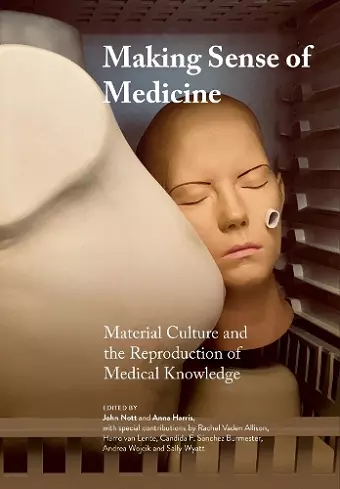Making Sense of Medicine
Material Culture and the Reproduction of Medical Knowledge
Anna Harris editor John Nott editor
Format:Paperback
Publisher:Intellect
Published:7th Nov '22
Should be back in stock very soon

Medical knowledge manifests in materials, and materials are integral to the reproduction of medical knowledge. From the novice student to the expert practitioner, those who study and work in and around medicine rely on material guidance in their everyday practice and as they seek to further their craft.
Students, just as experts, pore over textbooks, photographs and films. They put up and copy down chalkboard illustrations, manipulate plastic models and inspect organic specimens fixed in formalin. They pass through grand university libraries and try not to contaminate anything in cramped surgical theatres. Students, just as experts, learn within an expansive material culture of medicine, they learn from explicitly educative materials, from the workaday tools used for diagnosis and in treatment, they learn in everyday spaces and as part of sprawling infrastructures. While the specific constellation of material varies across time and space, many materials have remained constant, key actors in the spread of medical practices and in the steady, global expansion of biomedical frameworks of health and disease. This collection focuses on the materials, objects, tools and technologies which facilitate the reproduction of medical knowledge and often reify understandings of medical science.
The training of doctors is changing rapidly in response to technological development as well to the evolving needs and expectations of patients. Medical schools are beginning to respond to these challenges through curricula redesign and the purchase or endorsement of new teaching aids, simulations and pedagogies. Often, this means that medical schools are embracing the digital at the expense of older teaching materials. Medical education is at a critical juncture and there is momentum to radically rethink its approaches.
This collection offers a reflection on these challenges by presenting an innovative and expansive overview of the role of materiality in the training of doctors and in the social reproduction of medicine in general. Experimental in form, and with ethnographic, museological and historical cases, and traces from around the world, this edited volume is the first to fully explore the matter of medical education in the modern world. Supported by the European Research Council under the European Union’s Horizon 2020 research and innovation programme.
An academic text, it will be most relevant to academics and graduate students in the fields of health and material...
'A commendable feature of the collection’s exploration is the bringing together of contributions from historians, anthropologists, artists and curators, educators, surgeons and pathologists. In doing so, the collection offers interdisciplinary investigations and equips the reader with a thoughtful and critical understanding of educative technologies. [...] Overall, the collection is meticulously researched and well-written. It is a rewarding book as it is creative and experimental in its approach, and engages with new and familiar topics from interdisciplinary perspectives. The collection will certainly be a key text in inviting and guiding researchers to study the material culture of medicine’s objects of teaching.'
-- Rory du Plessis, Social History of Medicine'What is novel in the collection is its invention and ingenuity in trying to reach new audiences outside of Science and Technology Studies (STS). Doctors, artists and educators all feature as authors and participants in the essays, and often essays find experimental ways to explore the terrains of medical education. Uniting these various interlocutors is the consideration of how materials shape knowing. [...] There is a degree to which to know something one must do that something. To know how to steer a boat, one should get as close to the rudder as possible, should feel more closely the way that the water pushes against the instrument as it carves through its surface. One can’t learn at a distance. In Making Sense of Medicine, this collection suggests that we need to reposition ourselves, move our hand closer to the rudder. I am inclined to agree.'
-- Max Perry, The PolypISBN: 9781789385779
Dimensions: unknown
Weight: unknown
464 pages